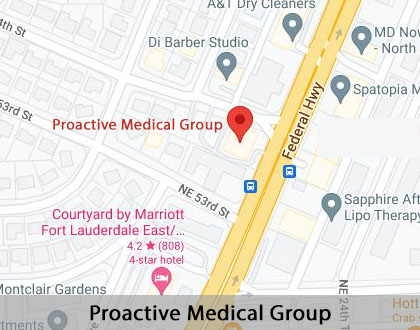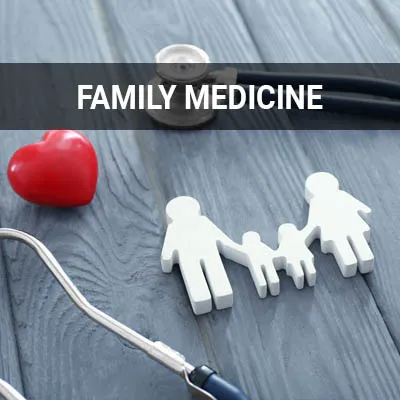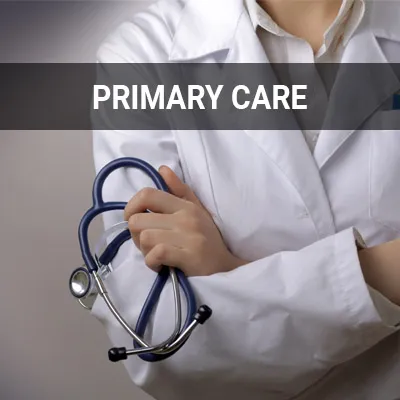Eating Disorder Treatment Fort Lauderdale, FL
Eating disorder treatment can help many people live healthy, functional lives. An eating disorder can disrupt all aspects of your health, from mental, physical, and emotional. Fortunately, a primary care physician can help with eating disorder treatment.
Eating disorder treatment is available at Proactive Medical Group in Fort Lauderdale and the surrounding area. You should never hesitate to get the professional help you need. Call us today at (954) 938-2843 to schedule an appointment or learn more about our services.
Types of Eating Disorders
Among the various types of eating disorders, three of the most common are anorexia nervosa, bulimia nervosa, and binge eating disorder. It is important to note that it is possible to exhibit symptoms that do not match traditional conditions and still have an eating disorder.
Anorexia Nervosa
According to Mayo Clinic, anorexia nervosa is typically characterized by abnormally low body weight. People with anorexia nervosa (also known simply as anorexia) are intensely afraid of gaining weight and have a distorted perception of weight. As such, they prioritize controlling their weight and shape, going to extreme measures that may interfere significantly with their everyday lives. There are physical, emotional, and behavioral signs of anorexia. These include, but are not limited to:
- Abnormal blood counts
- Binging and self-induced vomiting
- Bluish discoloration of the fingers
- Denial of hunger or making excuses for not eating
- Dizziness or fainting
- Excessive exercising
- Extreme weight loss or failure to make expected developmental weight gains
- Preoccupation with food
- Severe restriction of food intake
- Use of laxatives, enemas, diet aids, or herbal products
Bulimia Nervosa
Bulimia nervosa, also known simply as bulimia, is typically characterized by binging (eating large amounts of food without control) and purging (ridding oneself of the calories unhealthily). People with bulimia may use different methods to rid themselves of calories and weight gain. They may regularly self-induce vomiting or abuse laxatives, weight-loss supplements, enemas, or diuretics after binging. People with bulimia are also typically preoccupied with their weight and body shape. Bulimia has several symptoms, including:
- Abusing diuretics, enemas, or laxatives
- Fasting, restricting calories, or avoiding certain foods between binges
- Feeling a loss of control during binging sessions
- Forcing oneself to vomit or exercise too much
- Living in fear of gaining weight
- Preoccupation with one’s body shape and weight
- Repeated episodes of eating abnormally large amounts of food in a single sitting
Binge Eating Disorder
Binge eating disorder, sometimes abbreviated to BED, is characterized by episodes of binge eating. These episodes are associated with a sense of a loss of control and shame, distress, or guilt afterward. Unlike bulimia nervosa, however, persons with binge eating disorder do not compensate for the binging in unhealthy ways. Episodes of binge eating are characterized by the following symptoms:
- A compulsion to eat during the episode
- Eating alone because of feelings of embarrassment
- Eating an inordinately large amount of food
- Eating large amounts of food even when not hungry
- Eating much more rapidly than normal
- Eating until feeling uncomfortably full
- Feelings of disgust, depression, or guilt afterward
- Feelings of marked distress during eating
In most cases, binge eating occurs at least once a week for at least three months.
“Though there are several types of eating disorders, three of the most common are anorexia nervosa, bulimia nervosa, and binge eating disorder.”
Causes and Signs of Eating Disorders
It can be difficult to pinpoint a cause for an eating disorder. As such, anorexia nervosa, bulimia nervosa, and binge eating disorder all tend to have similar risk factors. According to Mayo Clinic, they all also tend to be more common in women than in men. Though the exact cause of anorexia nervosa, bulimia nervosa, and binge eating disorder is unknown, experts believe that they probably stem from a combination of factors. These factors likely include:
Biology
Some genetic changes may make certain persons at higher risk of developing eating disorders. In particular, those with first-degree relatives with an eating disorder may be more likely to develop one themselves. Additionally, it is believed that those with a genetic tendency toward perfectionism, sensitivity, and perseverance may be more prone to anorexia nervosa.
Dieting
Those who diet are at higher risk of developing eating disorders, as severe calorie restriction may trigger an urge to binge eat and purge. Other triggers for binging may include boredom, food, poor self-image, and stress. This is especially true for those with symptoms of depression.
Environment
As modern western culture emphasizes thinness, it also often conflates it with success and worth. Peer pressure may also fuel one's desire to be thin, particularly among young girls.
Psychology
Anxiety disorders, depression, and substance use disorders are all closely linked with eating disorders. People with bulimia or binge eating disorder often feel negatively about themselves, and they may also get triggered by traumatic events and environmental stress. On the other hand, many people with anorexia nervosa have obsessive-compulsive personality traits that may make it easier for them to stick to strict diets and go without food despite being hungry. They may also be extremely perfectionistic, causing them to think they are never thin enough.
According to the National Eating Disorders Association (NEDA), there are two types of symptoms of an eating disorder: (1) emotional/behavioral and (2) physical. It is important to remember that the below list is not exhaustive and that people with eating disorders may not necessarily exhibit all the signs at once. Symptoms may also vary across eating disorders and are not always easily demarcated. In any case, some emotional/behavioral signs of eating disorders include:
- Appearing uncomfortable eating around others
- Food rituals
- Preoccupation with weight, food, calories, carbohydrates, fat grams, and dieting
- Refusal to eat certain foods, progressing to restrictions against whole categories of food (e.g., no carbohydrates, etc.)
- Skipping meals or taking small portions of food at regular meals
- Withdrawing from usual friends and activities
Moreover, some physical signs of eating disorders include, but are not limited to:
- Abnormal laboratory findings
- Difficulties concentrating
- Dry skin and hair, and brittle nails
- Impaired immune functioning
- Menstrual irregularities
- Noticeable fluctuations in weight, both up and down
Eating disorders are more easily treated with early intervention. As such, it is imperative to be aware of the warning signs.
“Though the exact cause of anorexia nervosa, bulimia nervosa, and binge eating disorder is unknown, experts believe that they probably stem from a combination of factors.”
Benefits of Professional Eating Disorder Treatment
As previously established, most eating disorders have a psychological aspect. As such, it is crucial to address this part of the disease; otherwise, patients run the risk of relapse. Counseling can effectively address the psychological component of one's eating disorder while simultaneously enhancing their understanding of their condition. The more one understands their condition, the more they can understand how to control it.
Additionally, eating disorders are often comorbid with other mental health diagnoses. These may include anxiety, bipolar disorder, depression, or a combination of these issues. An eating disorder counselor can look for signs and symptoms of these disorders and recommend treatment accordingly. A counselor can also help patients develop a better self-image and coping skills.
Eating disorder treatment also gives patients the opportunity to express themselves in a safe environment. It is not uncommon for those with eating disorders to struggle with feelings of guilt or shame over the effects of their disease. An eating disorder counselor gives patients a chance to ask any questions they may have without fear of judgment. Counseling sessions are also often held with family members, giving patients a chance to rebuild or strengthen their relationships.
“The more one understands their condition, the more they can understand how to control it.”
Check out what others are saying about our primary care physician services on Yelp: Eating Disorder Treatment in Fort Lauderdale, FL
The Eating Disorder Treatment Process
The eating disorder treatment process is different for everyone, as it depends on each person's unique disorder and symptoms. In most cases, it involves a combination of psychotherapy, nutrition education, medical monitoring, and, at times, medications. Eating disorder treatment may also involve addressing comorbid health problems. Eating disorders that do not improve with standard treatment or cause health problems may also require hospitalization or another type of inpatient program.
Most people with eating disorders will benefit from a referral to a team of professionals who specialize in eating disorder treatment. This team may include a mental health professional, a registered dietitian, medical or dental specialists, and support members from the patient's friend group or family. For best results, everyone involved in the treatment process should communicate effectively with one another so any adjustments can be made to the treatment as necessary.
The treatment team will first determine the patient's needs before determining the goals and guidelines of the treatment itself. Ideally, the treatment will address physical complications, identify what resources are available to the patient, and work to identify affordable treatment options. Psychotherapy is the most crucial aspect of eating disorder treatment, and it involves seeing a mental health professional regularly. Registered dietitians and other related professionals can also help educate patients on their condition and teach them how to achieve and maintain healthy eating habits. Medications may also be necessary in addition to psychotherapy.
“The eating disorder treatment process is different for everyone, as it depends on each person’s unique disorder and symptoms.”
Questions Answered on This Page
Q. What are the three of the most common eating disorders?
Q. What causes eating disorders?
Q. What are some of the benefits of eating disorder treatment?
Q. What is the eating disorder treatment process like?
Q. Does eating disorder treatment require follow-up care?
People Also Ask
Q. What is the difference between healthy and unhealthy weight loss?
Q. What treatment options are available for general illnesses?
Follow-Up Care
Eating disorder treatment is an ongoing process that usually requires follow-up care. The first step for dangerously underweight individuals is to restore normal eating patterns and return to a healthy body weight for the patient's unique shape and size. Severe malnourishment can make it difficult to use psychotherapy effectively, as it may interfere with one's ability to concentrate or change patterns of behavior.
Though there are occasional exceptions, eating disorder treatment typically begins by addressing any life-threatening medical and psychiatric symptoms. Then, the treatment team will interrupt any eating disorder behaviors (such as binging and purging, et cetera), establish normalized eating and nutritional rehabilitation, and oppose unhelpful and unhealthy eating disorder-related thoughts and behaviors. Eventually, we will move on to treating ongoing medical and mental health issues and initiate a plan to prevent relapse. Patients may also need ongoing treatment for comorbid health problems, such as:
- Dental cavities and erosion of the surface of the teeth from frequent vomiting
- Digestive problems
- Electrolyte imbalances
- Heart problems and high blood pressure
- Nutrient deficiencies
It is important to remember, however, that the above list is not exhaustive. We will personalize each patient's treatment to meet their unique needs.
“Eating disorder treatment is an ongoing process that usually requires follow-up care.”
Frequently Asked Questions
Q. How common are eating disorders?
A. According to Johns Hopkins Medicine, anorexia nervosa affects 0.5% of women over their lifetime. Furthermore, bulimia nervosa affects two to three percent of women over their lifetime. The diseases usually set in between 12 to 25, with 10% of detected cases in males.
Q. Can eating disorders be life-threatening?
A. Yes. Among all mental illnesses, eating disorders have the second-highest fatality rate. As such, immediate medical attention is necessary. Clients should be as honest as possible with their medical provider for the best treatment.
Q. How are eating disorders diagnosed?
A. Diagnosis differs depending on the specific condition. Though many people believe that they can diagnose an eating disorder themselves, it is actually more difficult than it appears. Eating disorders often stem from another underlying cause. A qualified professional can help determine the most accurate diagnosis.
Q. I think I may have an eating disorder, but I am too embarrassed to talk to my doctor about it. What should I do?
A. There is no reason to feel ashamed about your symptoms. Many people are affected by eating disorders. They are potentially life-threatening conditions and are best treated when caught early. As such, it is crucial to be as honest as possible about your condition with your medical provider. We can develop the best personalized treatment plan for you.
Q. Can eating disorders cause medical problems?
A. Yes, and they often do. Eating disorders are associated with severe physical problems, including symptoms associated with low body weight, dental and gastrointestinal complications, and metabolic and cardiac complications. For these reasons, it is essential to see a primary care physician or, if necessary, a medical specialist.
Start Feeling Better – Visit Us Today
By visiting us as soon as possible, our team can help get you the professional treatment you need. Instead of waiting around and allowing the symptoms to get worse, we can provide you with treatment options.
Definition of Medical Terminology
Call Us Today
Eating disorders can greatly disrupt your everyday life. We at Proactive Medical Group can help. Call us today at 954-938-2843 to schedule an appointment or learn more about our services.
Helpful Related Links
- American Journal of Medicine. American Journal of Medicine. 2023
- American Medical Association (AMA). American Medical Association (AMA). 2023
- American Psychological Association (APA). American Psychological Association (APA). 2023
- CDC Overweight & Obesity. CDC Overweight & Obesity. 2023
- National Eating Disorder Association. National Eating Disorder Association. 2023
- U.S. Department of Agriculture Healthy Living and Weighty. U.S. Department of Agriculture Healthy Living and Weight. 2023
- World Health Organization Obesity. World Health Organization Obesity. 2023
About our business and website security
- Proactive Medical Group was established in 2022.
- We accept the following payment methods: American Express, Cash, Check, Discover, MasterCard, and Visa
- We serve patients from the following counties: Broward County
- We serve patients from the following cities: Fort Lauderdale, Oakland Park, Wilton Manors, Pompano Beach, and Sea Ranch Lakes
- Norton Safe Web. View Details
- Trend Micro Site Safety Center. View Details
Back to top of Eating Disorder Treatment










